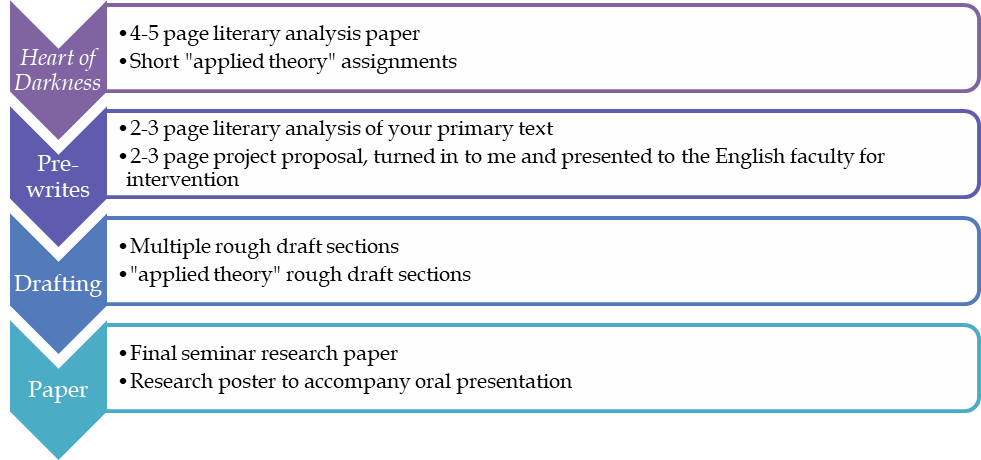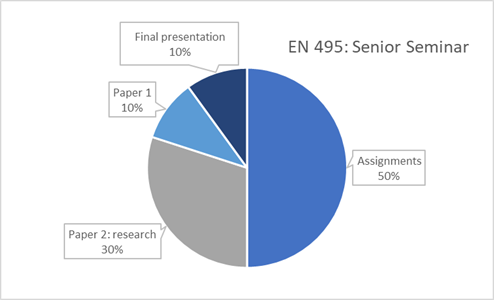EN495:
Prerequisites
Meeting Times, Location, & Course Delivery Details
Contact Information
Upon successful completion of this course....

Writing Assignments: We will develop each of the skills necessary to fulfilling your research project through in-class exercises, workshops, and writing assignments. Your writing for this course will be divided into several graded assignments:

SCHEDULE OF READINGS AND ASSIGNMENTS
| Theme: | Readings | Assignments | |
Aug 19 8/21 | Introductions, Research Projects & Questions Close reading analysis | Review all course materials & descriptions; discuss student topics & research questions Heart of Darkness I | Assignment 1: 4 textual observations explained with close reading
|
8/26 8/28 | Close reading analysis Close reading analysis | Heart of Darkness II Heart of Darkness III |
Assignment 2: 2-3 page close reading literary analysis draft |
Sept 2 9/4 | Reading criticism & applying theory | Conferences: Close reading literary analysis drafts “Darkness in Conrad’s Heart of Darkness”; What approaches can we bring to the text? Bressler chapters 3 (formalism, new criticism) & 4 (reader-oriented criticisms)
|
Paper 1 due WEDNESDAY by 4 pm
|
9/9 9/11 | Reading criticism & applying theory Reading criticism & applying theory | Heart of Darkness discussion & theory; Bressler ch’s 5, 8 & 10 (modern/post-modern/ structuralism/deconstruction, Marxism, post-colonial)
Heart of Darkness discussion & theory: Bressler ch’s 6, 7, & 11 (psychoanalysis, feminism, African-American crit)
| Assignment 3: Applied theory in context (2 pages) Assignment 4: Applied theory in context (2 pages)
|
9/16 9/18 | Reading criticism & applying theory Discuss project books–summaries to share, working thesis | Bressler 9, 12 & 13 (cultural poetics/new historicism, queer, ecology);
Your research questions and close reading of your texts | Assignment 5: Applied theory in context (2 pages)
|
9/23 9/25 | Applying theory | Apocalypse Now, Conrad revisited Apocalypse Now, Conrad revisited | Assignment 6: Close reading analysis drafts due |
9/30 Oct 2 | Database navigation Evaluating Sources, Bibliographies | Working Bibliographies; library databases
Discuss Proposals | Assignment 7: Literary analysis of your primary work due Assignment 8: Research questions |
10/7 10/9 | Writing schedules, work log Presentations | Writing schedules & drafting plan Conferences – research proposals English Faculty Intervention | Assignment 9: Outline & working bib due Assignment 10: Bring 4 copies of research proposal to present to English faculty |
10/14 10/16 | No class Drafting workshop | Faculty In-Service Drafting workshop | |
10/21 10/23 | Peer Review 1 Secondary sources | Bring in 3 short sections of the close reading you will incorporate into your paper, fully drafted, triple spaces. 2 copies Secondary source interaction & application: bring 3-4 of your secondary sources to class | Assignment 11: Peer Review 1, 4-page section, triple spaced, 2 copies |
10/28 10/30 | Peer Review 2 Conferences | Your choice, 4-5 page section Conferences – section one draft | Assignment 12: different 4-page section with at least 2 secondary sources integrated (tripled spaced, 2 copies) |
11/4 11/6 | Peer Review 3 Conferences | Workshop, 8-10 page draft Conferences | Assignment 13: 8-10 page draft
|
11/11 11/13 | Peer Review 4 Full-text editing | Peer Review 4: (Introduction & conclusion only!)
Editing: In-text citations & bibliography formatting (full draft of paper and bibliography required!) | Assignment 14: Introduction & conclusion only
|
11/18 11/20 | Conferences Presentation overview | Conferences Presentation/poster overview | Assignment 15: Full paper draft! |
11/25 11/27 | Presentation workshop THANKSGIVING | Workshop presentations
Give thanks that your paper is in! | Final Papers Due by the beginning of class
|
| 12/2 | Project presentations | Project presentations to English faculty & EN 134 class | Final presentation slides/poster due |
See syllabus calendar and Blackboard
Grade Breakdown:
50% Assignments
30% Paper 2: Final Research Paper
10% Paper 1: 4-5 page paper
10% Final paper presentation

Grade Scale:
A | 93.5 < | B+ | 87 < | C+ | 77 < | D | 60 < |
A- | 90 < | B |
| C | 73.5 < | F | >59.9 |
|
| B- | 80 < | C- | 70 < |
|
|
Instructor Course Policies
COURSE REQUIREMENTS:
Attendance: Attendance is mandatory, as is punctuality. We will begin each class promptly and go directly into quizzes, lecture and class activities. You get 3 absence freebie’s, after which there will be a 2-point deduction from your final course grade for EACH additional absence (illness, death, relationship drama, POS car, alien abduction…please at least be original!).
Reading: This is a literature course so you will be expected to keep up with the readings, be ready to discuss the materials, and engage in a thoughtful dialogue with your peers. These readings will also be the primary source material for the writing assignments required in this course.
Quizzes and Exams: There will quizzes on terms and readings throughout the course! No exams 😊
You’re welcome.
Presentations: You will be presenting your research project to the English faculty twice; a proposal and rough outline in mid-October (think of this as early intervention) and then in December we will gather with the EN 134 students to present your final paper.
Peer reviews: The drafting of the final paper will be broken up into sections. Each section will be due at regular intervals for peer and instructor review.
PLAGIARISM: Don’t do it. Plagiarism is addressed in the Student Handbook (Student Life Policies, Academic Integrity, Plagiarism): “To quote from Practical English Handbook (Watkins, Dillingham and Martin, 1978, 260): ‘Using others’ words and ideas as if they were your own is a form of stealing called plagiarism.’ In academic or scholarly writing, plagiarism offends the community of learning as seriously as does cheating on an examination. Developing the habit of giving appropriate credit to others for their ideas is important not only in school but in all other professional and life situations” (quoted in WC Student Handbook, 21).
Any plagiarized assignments or papers (in part or in full) will result in an automatic zero in this course. Infractions will also be reported to the office of Academic Affairs and recorded in your student file.
Institutional and Program-Level Policies
All exams will follow the Final Exam Schedule. Students scheduled to take three or more final examinations on one day may request to arrange their examination schedule, so no more than two exams occur on one day.
Requests for early or late exams are considered only under extreme circumstances. Prior to the exam period, the student must file a written request on the Early/Late Exam Form available in the Student One Stop Center, Academic Records, and on the WC portal. The form must be signed by the Instructor and the Academic Dean, approving the alternate exam time. This process must be completed prior to the scheduled exam period.
Undergraduate: SP25 Final Exam Schedule Graduate:
Out-of-class Work Expectation A minimum of 2 hours of out-of-class student work is expected for each hour of in-class time for traditional face-to-face courses. For online and hybrid courses, the combination of face-to-face time and out-of-class work should be equal to 3 hours per credit hour per week. |
Instructional Course Delivery |
Academic Integrity Policy The use of generative AI is prohibited except where expressly allowed in assignment instructions. |
Class Attendance Policy |
Accessibility and Disability Services
Accessibility and Disability Services
Wilmington College provides accommodations and services for student with a variety of disabilities, including chronic illnesses, psychological, physical, medical, learning, and sensory disability amongst others. If you anticipate or experience barriers based on disability and feel you may need a reasonable accommodation to fulfill the essential functions of this course, you are encouraged to contact:
Spencer Izor, Associate Vice President of Compliance - Title IX/ADA Coordinator at spencer.izor@wilmington.edu or 937-481-2365 or Nathan Flack, Academic Resource Manager at 937-481-2208 to learn more about the process and procedures for requesting accommodations, or by visiting College Hall Room 306a or the Robinson Communication Center, Room 103.
Religious Accommodations
Wilmington College strives for an inclusive climate and welcomes students from all backgrounds, faiths, and experiences. If religious observance impedes your ability to participate fully in classroom activities or a principal holiday from your religious tradition occurs during the semester and conflicts with class meetings or activities, please make the professor aware of this immediately to determine if a reasonable accommodation is possible.
